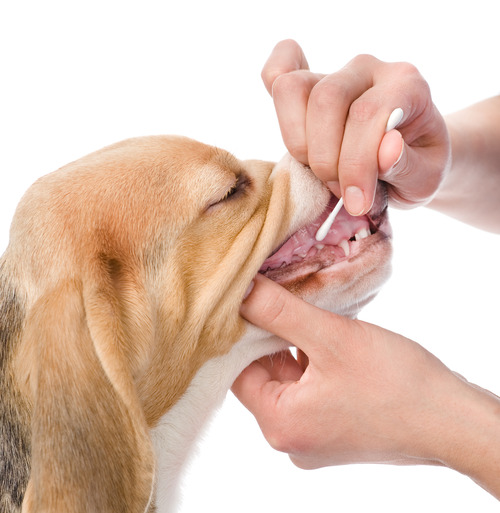Dental care is a critical aspect of your dog’s lifelong care and overall health. Here, we will focus on periodontal disease in dogs, including its treatment and preventive measures to maintain healthy teeth and gums. Everyone here at Cheyenne Mountain Animal Hospital in Colorado Springs, CO, is dedicated to providing complete dental care for your pet so they can avoid the discomfort and stress of periodontal disease. Be sure to reach out to us at (719) 475-1314 for more information or to schedule an appointment.
What You Need to Know About Periodontal Disease in Dogs
Periodontal disease is a prevalent condition in dogs that affects the structures around the teeth and gums. As common as this condition is, it’s also entirely preventable. The disease process begins with the formation of plaque, a mix of food particles, saliva, and bacteria, on your pet’s teeth along the gum line. Without removal, this plaque calcifies into tartar, leading to gum inflammation or gingivitis. If this isn’t treated, the disease can progress, affecting deeper structures of the teeth and leading to significant oral health complications for your pet. These complications may include tooth loss, weakening of the jaw bone, and disease of the heart, liver, and/or kidneys.
The Stages of Periodontal Disease
Periodontal disease is progressive in nature. Once it starts, it can only be stopped with timely treatment. There are four identifiable stages of periodontal disease in dogs:
- Gingivitis: The initial stage, marked by swollen, red gums, indicates early plaque accumulation. It’s reversible with prompt dental care.
- Early Periodontitis: This stage involves minor bone loss and gum recession. Early intervention can stop its progression, but some effects are irreversible.
- Moderate Periodontitis: Noticeable bone loss and increased gum recession occur at this stage, along with tooth mobility. The disease has a significant impact but can still be managed with intensive care from your veterinarian.
- Advanced Periodontitis: In this severe stage, considerable bone loss and loose teeth are common, posing high risks for oral pain and infections. It requires extensive dental intervention to treat.
How to Tell If Your Dog Has Periodontal Disease
Periodontal disease is not easy to detect in its early stage, but there are some red flags to look for in your pet. Here’s what we typically see in dogs suffering from periodontal disease:
- Intense gum inflammation and recession, with tooth roots becoming visible.
- Loose or missing teeth due to weakened structures supporting the teeth.
- Chronic bad breath, a result of bacteria and decaying dental tissues.
- Gum bleeding, especially noticeable when your dog eats or if their gums are touched.
- Difficulty in eating or a noticeable reduction in appetite, which is often linked to oral pain.
- In advanced stages, symptoms like nasal discharge and sneezing can indicate an infection spreading beyond the oral cavity.
Addressing Periodontal Disease with Various Treatment Modalities
Managing periodontal disease in dogs involves several steps:
- Professional Dental Cleaning: We need to perform an intensive cleaning with your pet under anesthesia, including scaling (removal of tartar) and root planing (smoothing the root surfaces).
- Tooth Extractions: Often, dogs with moderate to severe periodontal disease need to have some or all of their teeth removed, due to the teeth being decayed and damaged.
- Antibiotics and Pain Management: These are essential for controlling infection and managing pain, enhancing your dog’s comfort.
- Regular Veterinary Follow-Ups: It’s important to check in with your veterinarian regularly for oral exams and teeth cleanings for your dog. This keeps your pet’s mouth healthy and prevents the recurrence of disease.
Observing the Positive Changes for Your Pet Post-Treatment
Dogs often exhibit noticeable improvements after receiving treatment for periodontal disease, even if that treatment requires extractions. The benefits they receive from our care include:
- Enhanced Appetite: Alleviation of oral pain can lead to a resurgence in normal eating habits.
- Increased Vigor and Playfulness: As pain subsides, many dogs show a renewed energy level and willingness to engage in activities.
- Improvement in Breath Quality: Addressing the root causes of bad breath can lead to a fresher-smelling mouth.
- More Social and Interactive Behavior: Dogs in less discomfort tend to be more sociable and engage more with their owners and surroundings.
Schedule Your Dog’s Next Dental Checkup with Us
At Cheyenne Mountain Animal Hospital, we understand the importance of your dog’s dental health and are committed to providing the best care possible. For more information or to schedule an appointment, please call us at (719) 475-1314! We look forward to answering your questions and helping you improve your dog’s quality of life.





